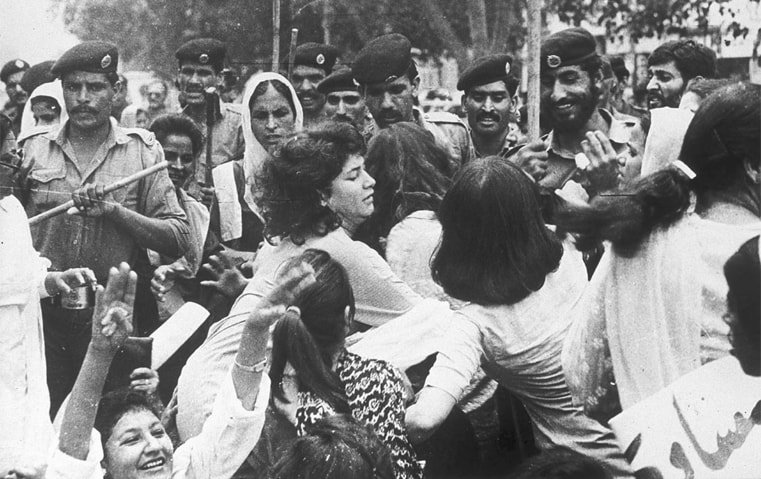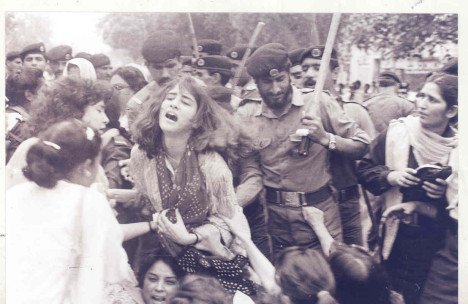
Herald Report
As we celebrate the near four decades struggle launched by women activists for equal rights in Pakistani society and for democratic and secular values, there is a need to learn from past experiences, failures, successes and redefine the objectives, and direction of such movements in the face of emerging challenges like climate change, rising tide of extremism, authoritarianism and neoliberal economic policies of the imperialist powers posing existential threat to humanity in today’s world.
The Women’s Action Forum was one of the pioneering rights movements founded on 16th September 1981 in Karachi to struggle against the military dictatorship, religious discrimination and for the rights of women, minorities and marginalised people.
In a statement issued on the 38th anniversary of the movement, WAF Islamabad chapter says “WAF is a secular and non-hierarchical organisation that believes that women rights are human rights and that all citizens must enjoy the same rights, dignity and equality, regardless of class, creed, sect, ethnicity, and faith.”
The forum which has chapters in all provinces of Pakistan, after 38 years, continues its activism as a collective with members belonging to all social classes, generations, cultural and ethnic background.

WAF has played a pivotal role in placing women’s rights on the national agenda by raising awareness at different levels of society. In the eighties, it actively supported the Movement for the Restoration of Democracy and lobbied successfully with political parties to include women issues in their party manifestoes.
It played a major role in the protest against the proposed Islamic Law of Evidence in Lahore on 12th February 1983, the first public protest against military dictator General Ziaul Haq’s Islamization. The historic protest and brutal use of police force against the women protesters ignited a new spirit among the women. The women held their ground despite use of tear gas, baton-charge, injuries and arrests that made national and international news.
It was a turning point for WAF, for the women’s movement and the movement for democracy which is now celebrated as National Women’s Day. Some of the landmark struggles and achievements are pertinent to be mentioned here:
In 1992 WAF took a stand against the Blasphemy Law and the mandatory death sentence fearing that it would be used/abused for personal ends and vengeance against opponents. WAF’s apology to the women of Bangladesh in 1996, position on crimes against humanity and crimes against women in times of war and conflicts and retroactive responsibility was a forerunner to the UN Security Council resolution 1325 on women peace and security passed in 2000. WAF’s historic political experiences include the re-writing the Universal Declaration of Human Rights from a feminist, decolonizing perspective in 1995, to filing a judicial reference against the former Chief Justice for violating article 209 of the Judges’ Code of Conduct, in 2018.

“As a pressure group, WAF has struggled against discriminatory laws, violence against women and minorities, all informal legal systems, urban realtor mafias and land grabbers. Its campaign for many years for the repeal of the Hudood Ordinance and the passage of Women’s Protection Bill were instrumental in providing protection to women. WAF has stood against militancy, wars, sexual harassment, constitutional abrogation, privatization of state entities, bigotry, enforced disappearances and interference of the military in state and judicial system or judicial adventurism. At the worst of times and bleakest of moments, WAF has often been the first to break the silence imposed by oppressive forces,” the statement read.
“Today, when the middle class and the working class have been left at the mercy of rapacious market forces, WAF reiterates its support to movements against the neoliberal economic agenda of the imperialist powers, capitalist exploitation of labourers and stands in solidarity with trade unions.
“WAF calls for civilian supremacy, provincial autonomy under the 18th Amendment, land reforms, pro-women legislation, and the rights of the transgender and LGBT communities, as well as for regional peace and friendly ties with our neighbouring countries.
“We believe the anti-poor evictions taking place in Karachi and the Islamabad capital territory (ICT) under the inhumane neoliberal policies of this government will deepen existing inequalities of resources and opportunity and accelerate lethal damage to our already precarious ecosystems.
 “WAF is deeply dismayed at the prevailing backlash under the PTI-led government which is imposing blatant censorship on freedom of media and freedom of expression, persecuting opposition elected representatives, witch-hunting and trials without credible due process, and economic policies dictated by IMF, while citizens are being crushed under the current crippling ineffectual austerity drives. It seems that women’s and human rights do not exist on the political agenda of the current military-led government.
“WAF is deeply dismayed at the prevailing backlash under the PTI-led government which is imposing blatant censorship on freedom of media and freedom of expression, persecuting opposition elected representatives, witch-hunting and trials without credible due process, and economic policies dictated by IMF, while citizens are being crushed under the current crippling ineffectual austerity drives. It seems that women’s and human rights do not exist on the political agenda of the current military-led government.
“WAF is heartened by younger generations of activists who are joining and continuing the struggles for the supremacy of civilian parliamentary democracy and striving against sexism and bigotry and calls upon all progressive movements of Pakistan to band together and join in a commitment to restore civilian supremacy, ensure freedom of expression and release of political prisoners.
“We call on the government to restore due process in a transparent and fair manner, reverse anti-poor policies and promote women’s and minorities’ rights as enshrined in the Constitution and to amend discriminatory laws and policies. We call upon all Pakistanis to join hands with the WAF to carry forward the torch of resistance and struggle for rights and equality and to light the way for justice, democracy, pluralism, and dignity.
WAF is committed to its principled stance that religion must be separated from state affairs and reiterates its demand that the security organisations and religion should be disengaged from politics, economic and governance affairs, it said.
The organisation and other such movements including Women Democratic Front, must acknowledge the contribution of pioneers of women rights movements including Asma Jahangir, Tahira Mazhar Ali Khan, Tasneem Minto, Kishwar Naheed, Fahmida Riaz, Afia Zia Zareena Salamat, Iqbal Sultana, Samreen Hashmi and many others and pledge to continue their mission for establishing an egalitarian society based on gender, class, economic, ethnic and religious equality.
Also see this video: https://youtu.be/1HVJANrwt2k

